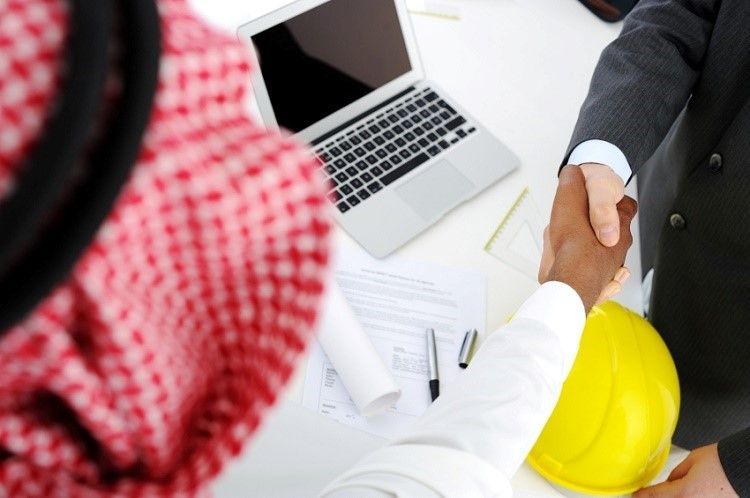To successfully negotiate in Arab countries it is essential to take into account their protocol and business culture, in certain aspects so different from the Western world. The Arab countries constitute a traditional culture based on the principles of their religion -the Islam- which, however, is constantly evolving, adopting behaviour patterns typical of developed countries; this mixture is somehow difficult to understand for foreign businessmen who visit these countries.
The different sections of this article focus on a particular aspect of business culture and etiquette in the region, including: how to plan meetings, negotiations with Arab business partners, greetings, non-verbal communication, hospitality, dress code and, very important, religious considerations.
One aspect that has to be clear when doing business in Arab countries is that culture and religion are inseparable. Religion is a permanent force that has very significant effects on the way of doing business; hence, the importance for the foreign negotiator to know the Muslim religion and respect its principles, that have a notable influence on the Arab etiquette and business culture.
Wasta: Introduction through personal contacts or intermediaries
Business culture in Arab countries is based in a system commonly known as wasta, Wasta follows that well-known Western maxim of, “It’s not what you know but who you know”. In the Arab world this is a widely exploited system and it is viewed as neither shameful nor underhand, but simply as part of the normal course of business and daily life. If you have high-powered contacts or friends in the right places you are likely to find that bureaucracy and business run in a much smoother fashion. A system of borrowed and returned favours is also prevalent. If you are asked a favour by a business partner, endeavour to fulfil it or at least give the semblance that you have tried your best. Never refuse outright to do something when it is clearly a case of wasta. Even if you are not able to get your contact what he/she needs or wants, your effort and enthusiasm will be remembered, appreciated, and surely repaid in time.
Trust is the key in the Arab business world
Although this is changing as Arab countries gain more exposure to Western business practices, for many Arabs there is no separation between personal and professional lives, and as such, a potential business partner must also be considered a potential friend.
It is imperative to organise a face to face meeting as the ability to build trust is greatly increased in this environment. An Arab businessman/woman will want to engage in small talk on a personal level before the purpose of the visit or meeting is even brought up. This is all part of a desire to understand you on a personal, friendly level, before discussing business.
Small talk is incredibly important in establishing friendly business relations. You must be ready to answer questions about your travel, your home, your experience of the country you have travelled to, your health, and the health of your family. It is a good idea to have a few anecdotes or stories ready to entertain with, and to ask all the questions back to your acquaintance. Be aware that it is usual and expected to ask after the health of an Arab’s family, and perhaps some general questions about his/her children, but avoid asking specifically after female members of the family, as this can cause offence in more conservative societies.
Business meetings in the Arab world
Although this will vary from country to country and indeed business to business, organisation in the Arab countries can tend to be more last-minute than in other parts of the world where at least initial meetings must be booked weeks if not a month in advance. Try not to organise a meeting too far in advance, and be sure to confirm the meeting by telephone a few days beforehand.
The first thing to note when getting into the nitty-gritty of meetings in the Arab world is that the concept of punctuality can be very different. Do not be surprised if your counterpart is up to half an hour late, sometimes longer. Time moves in a different, more relaxed fashion and it is easier to go with the flow than to get frustrated. Having said that, it is advisable that you as the visitor show up on time as a sign of respect to your host.
Meetings tend to be structured very differently in the Arab world. You may expect a much more circular structure as opposed to the rigidly linear tendencies of most Western business practices. Agendas are likely to be lacking. After the customary five minutes of small talk, the point of business will be brought up and discussed, most likely with the most senior businessman in the room leading and directing the discussion.
Interruptions are common, even during what may feel like it should be a private meeting. Other employees or visitors entering the office or room in order to obtain signatures or advice, phone calls to be taken, or emails to be checked should all be expected as part of the lengthy process of a business meeting in the Arab world. This aspect of a meeting in the Middle East has been compounded by the rapid spread of smartphones across the region. Arabs are very open to checking their smartphones and communicating with them, even when they are sitting and talking with you face to face. Be prepared for this and try not to get frustrated or to take offence. In the Middle East this is not a sign of disrespect, it is simply part of today’s technology-fueled culture.

Face to face negotiations
There is much less of a divide between personal and professional life in the Arab world, and therefore personal contact and face to face negotiation is key. Avoid trying to do business over email or telephone and instead make the effort to organise a physical meeting. Having a senior contact in a company or organisation is imperative to actually penetrating the market, so if you lack one of these, consider employing an intermediary, or someone commonly known as a “contact-sponsor” to guide you to the right person.
Negotiations with your Arab business partners
It is crucial to remember that the Arab societies were and in many ways still are traditional trading societies, and that it is therefore normal to expect an Arab businessman to drive a hard bargain. You have been warned.
The pace of negotiation is often much slower in the Arab world, so stay patient and do not try and rush your counterparts into a deal. The same patience is crucial when dealing with the bureaucracy and paperwork prevalent in every Middle Eastern country. The time and effort it takes to get visas, permits, and other necessary paperwork can be demoralising, but if you are prepared to sit out the wait, it will be all the more rewarding.
Another difference in the way in which Arabs negotiate is the tribal or associative mentality. Most Arab societies still hark back to their tribal origins even if society has progressed away from this structure politically. This can influence negotiations since the lead negotiator is likely to want to discuss the decision with the whole team before confirming an agreement, so again, allow more time for this stage of negotiations.
One of the most important things to remember when doing business in these countries is that many Arabs find it extremely shameful to be seen to lose face in public at any point. Try not to directly disagree with or contradict anyone during the meeting. Telling someone you think he/she is wrong is a sure way of causing them to lose face, meaning no business deal for you. Instead, try subtle indicators of disagreement, using phrases such as, “In order to move forward I think it may be better to…”, or, “In my experience such and such has been more effective, so perhaps that would be worth considering.”
It is always advisable to follow up a meeting with an email exchange or phone conversation in which it is perhaps easier for Arabs to express their opinions and wishes candidly.
Non-verbal communication
Body language takes on even more importance in the Arab context, then, since public disagreement is so risky. Be on the lookout for all the usual signs of positive and negative reactions through body language, and know that this may well be a better indicator of a person’s opinion than what his speech suggests.
Also remember in the realm of body language that pointing and the thumbs up sign are considered rude in many Arab cultures, as is crossing your legs when sitting and displaying the sole of your shoe to someone.
A note here on personal space in the Arab world is necessary. Arabs often give you much less personal space than is usual in the West, and as such will stand or sit much closer to you, touch you more, and perhaps even take your hand when leading you somewhere. This, although very unusual from a Western viewpoint, is simply a cultural difference.
Calendar and holidays in Arab countries
One of the most basic but most easily overlooked details about business in Arab countries is the different working week. Friday is the holy day in Islam, and congregational prayers are held at noon. Therefore, the weekend in most Middle Eastern countries falls on Friday and Saturday, although there are some exceptions. This chart below details the different weekends across the region:
| Country | Friday/Saturday | Saturday/Sunday |
| Algeria | √ | |
| Bahrain | √ | |
| Egypt | √ | |
| Jordan | √ | |
| Kuwait | √ | |
| Lebanon | √ | |
| Libya | √ | |
| Morocco | √ | |
| Oman | √ | |
| Qatar | √ | |
| Saudi Arabia | √ | |
| Sudan | √ | |
| Syria | √ | |
| Tunisia | √ | |
| United Arab Emirates | √ | |
| Yemen | √ |
One time of the year when professional and personal lives are turned upside down in is during the month of Ramadan. Ramadan is considered the holy month by Muslims and sees them fasting from dawn to dusk, forbidding them from eating, drinking, and smoking. Business hours are often significantly reduced and it is wise to avoid doing business or organising meetings during this month. Again owing to the lunar calendar, the exact dates of Ramadan vary both year on year and from country to country, and in fact the fasting will only start once the correct moon has been sighted in each country, rather than there being an official starting date. Also note that if you do happen to be in an Arab country during Ramadan, it is polite to eat, drink, and smoke inside and away from the public eye only.
Besides the weekends and Ramadan, there are two major Muslim festivals to note: Eid al-Fitr and Eid al-Adha. The first follows the end of the fast during the month of Ramadan and the second the end of the annual pilgrimage (also known as Hajj). These festivals typically last three days but it is common for governments to extend them as they wish. Since the Islamic calendar follows lunar rather than solar movements it is difficult to predict exactly when the holidays will fall, and the dates will vary from country to country and year to year. It is therefore a good idea to avoid planning business around the times of these two festivals.
Greetings in Arab countries: useful phrases
Arabs are extremely proud of their language, not least since it is derived from the Classical Arabic used in the Holy Qur’an to record the revelations sent down to the Prophet Muhammed (PBUH) by Allah.
It is therefore recommended that you learn some simple Arabic greetings to establish a friendly connection with whomever you might be meeting. The assumption is that foreigners would not have bothered to learn any Arabic before arriving, so a little knowledge goes a long way. Below is a short list of useful phrases:
| When/where to use | Transliteration | Arabic | English meaning |
| Initial greeting | As-salaam alaykum | السلام عليكم | Peace be upon you. |
| Response to above | Wa alaykum as-salaam | وعليكم السلام | And peace be upon you too. |
| Hello | Marhaba | مرحبا | |
| How are you? | Keif al-haal? | كيف الحال؟ | |
| Response to above | Al-hamdulillah | الحمد لله | Thanks be to God. |
| Please | Min fadlak (to a male)
Min fadlik (to a female) |
من فضلك | |
| Thank you | Shukran | شكرا | |
| Expression common when discussing future plans or action | Inshallah | إن شاء الله | God willing. |
| Goodbye | Ma As-salama | مع السلامة | Go in peace. |
Handshakes are the typical form of physical greeting in the Middle East, but are likely to last longer than Westerners are used to. It is recommended that you wait for the other person to withdraw his/her hand before you do. If you are a man greeting an Arab businesswoman, wait for her to extend her hand as particularly conservative women may choose to not shake hands with men. In a similar vein, if you are a businesswoman meeting Arab businessmen, wait for them to initiate the handshake.
How to address the person you are meeting properly will vary from country to country and business to business, but it is best to remain formal if unsure. You yourself are likely to be addressed by Mr/Ms followed by your first name.

Dress code for business
Businessmen visiting Arab countries can expect to dress very similarly to usual. A smart business suit will suffice (although dark colours are recommended), and in some areas much more casual attire is suitable, depending on the country, region, and business sector, much like anywhere else in the world. Avoid wearing shorts and short sleeved shirts or t-shirts.
Businesswomen should always make sure to dress conservatively, covering arms at least to the elbow, legs to the ankles, and avoiding displaying any cleavage. The exact dress code for women depends greatly on the country or if there is a particular dress code which must be adhered to (very occasionally by law).
Many Arab societies are very concerned with outward appearances as evidence of social status, and good quality clothes reflect a comfortable or powerful position in society. It is therefore recommended that you pay attention to the quality and appearance of the clothes you are wearing in order to make a good impression.
Be aware that your Arab counterparts, especially in the Gulf countries, may wear traditional dress. This usually consists of a long white robe known as a thawb and often also a red and white checked headdress called a keffiyeh. The exact style and colour of this dress will vary from country to country, region to region, and even tribe to tribe.
Most women in the Gulf dress in the traditional black robe called an abaya and will wear a headscarf. Do not be tempted to don the traditional dress yourself as this could well cause offence to those who wear it as a symbol of a continuing heritage and tradition.
In North Africa (Morocco, Tunisia), the way businessmen and women dress varies greatly. Some will dress traditionally, and others will dress in the suits or general attire that you would expect to come across anywhere else in the world.

Hospitality in Arab societies
Hospitality is a key aspect of Arab culture, bound up with the honour and respect of your family. Be ready, therefore, to have refreshments, gifts, and invitations loaded upon you, and know that it is part of the culture and completely normal.
You will likely be offered some sort of refreshment during a meeting, be it tea, coffee, juice, biscuits, or dates, to name a few common examples. Be sure to accept this hospitality. Whether to accept as soon as this is offered or after a repeated offer depends on the country, so see below for tips.Your host may invite you to a restaurant meal. It is good practice to return the invitation. It is usual for the person who does the inviting to pay the bill. If for any reason the group is going to split the bill, it is better that one person pays and is reimbursed by the others in private, rather than the accounting being done in public at the table.

In the same way that you will find hospitality bestowed upon you when in the Arab world, if you extend an invitation to an Arab, whether in his/her country or in your home, he/she will expect similar hospitality and generosity from you. Properly hosting and welcoming Arabs is a case of giving the utmost that you have to offer, regardless of means. Examples include providing and paying for all food, drink, and transportation or acting as a tour guide of the city’s main landmarks. Make sure to accommodate their wishes, and really treat them to the experience of your generosity. This is the best way to impress Arabs in the realm of hospitality.
Religious considerations when working in Arab countries
Muslims are obliged to pray 5 times a day, and prayer times are announced by the call to prayer which sounds from local mosques as well as being printed in daily newspapers. The rough timings of the 5 prayers are as follows:
- Al-Fajr – Dawn, before sunrise
- Al-Zuhr – Midday, after the sun has reached its highest point in the sky
- Al-‘Asr – Late afternoon
- Al-Maghrib – Just after sunset
- Al-‘Isha – Between sunset and midnight
Not all Muslims will go to the mosque to pray, many preferring to pray at home or in the office. Be aware that there will be separate prayer rooms for men and women in offices. It is a good idea to take prayer times into consideration when scheduling meetings.
Muslims are forbidden from consuming both pork and alcohol, and as such these products are difficult to find in many Middle Eastern countries, and illegal in others.
Anyway, a region diverse in geography, ethnicity, religion, and cultural practice, the heterogeneity of the Arab world means it is necessary to delve into the details of the economy and culture of each individual country in order to discover the opportunities available to the savvy businessman.
If you want to know in depth the essential aspects for doing business in the main Arab countries click on the following Business Culture and Etiquette Guides:
Algeria
Egypt
Iran
Morocco
South Arabia
Tunisia
United Arab Emirates



